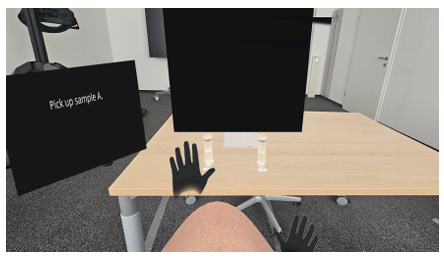Research Roundup (#30)
.png/:/rs=w:1440,h:1440)
Welcome...
Welcome to the thirtieth-ever Research Roundup! A fortnightly catch-up on the latest developments in the field of XR research.
It’s been a busy couple of weeks, so let's not hang around.
The Fortnight in 3 (Sentences)
New research on the side-effects of VR explored what happens when users leave VR, whether physical walking always reduces VR sickness, and whether virtual noses in VR affect odour perception.
Studies this week examining learning and engagement asked what the best way is to make educational VR adaptive, whether VR field trips enhance STEM learning, and whether VR can enhance advertising engagement using 360° videos.
And finally, studies examining therapeutic applications investigated whether near-death experiences in VR might reduce death anxiety, and whether VR-induced hypnosis could reduce dental anxiety in children.
The Fortnight in 300 (words)
Sometimes there is nothing more satisfying than seeing a virtual nose in VR. In 2015, researchers from Purdue proposed that having a virtual nose may reduce cybersickness, with some intriguing preliminary data supporting that conclusion. Over a decade later, and with several published failures to replicate, it is an idea that has faded from view despite it’s general appeal. However, every now and then it pops back up, as it did this week when researchers from Austria and the USA decided to test whether it improves odour perception. Their participants completed a just-noticeable difference task smelling butanol of different concentrations, with and without a virtual nose. Did it make a difference? Not particularly, but it was a nice idea to try.

As VR field trips become more accessible educators are quite sensibly asking what benefits there are to such an experience. But educators, being educators, are often highly suspicious of claims they see as marketing hype (and quite right too). Researchers at Northeastern University have, to some extent, come to the rescue sharing evaluative data from embedding VR field trips within a high school engineering class. They shared evidence that, in this context, the VR field trips were able to induce emotional reactions and increase intrinsic motivation. However, there was no evidence of changing long-term attitudes and beliefs about STEM. This is consistent with broader findings in education in which motivation and engagement are consistently improved whilst other outcomes are, well, mixed. I’m sure this won’t impact the hype at all, but maybe it should!
And finally, ever had a near-death experience? Do you want to? Working on the premise that such experiences might be good for you, reducing death anxiety and stress, researchers have reported on the potential positive benefits of a near-death experience in a sample of young adults. Using a 360-video developed by the International Association for Near-Death Studies (yep), the participants watched someone having a car accident, slipping into a coma, and experiencing various scenes including lights in a tunnel, serene landscapes, out-of-body experiences, and reminiscences of times with friends and family. The researchers found statistically significant reductions in death anxiety and stress. So all good. But… around a third of the participants actually left more anxious about death, and more stressed. Hmmm, a lesson there about how means, and statistical significance, can mask the individual experience. Maybe I’ll give it a miss for now.